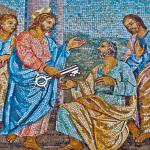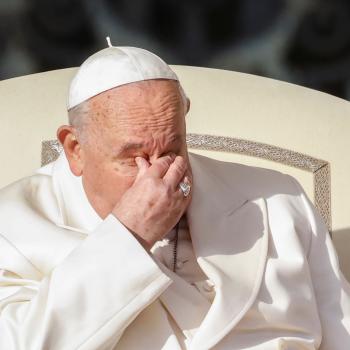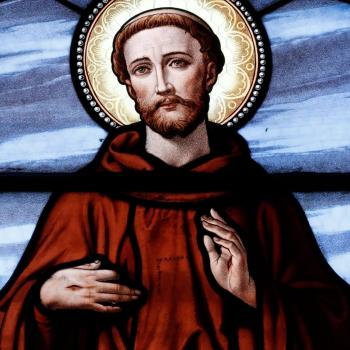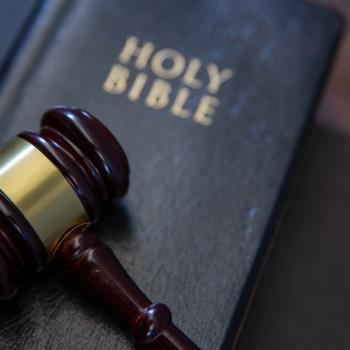In the last post, I tried to provide a fair outline of the Roman Catholic view of tradition and the Reformation view of tradition as they relate to the written Word of God, the Bible. In this post I will try to show advantages, and disadvantages, to adopting either of these views. Of course, I do not expect that people will become Roman Catholics or Protestants based on rational deliberation alone. Instead, I imagine people will be drawn to one view or the other in virtue of something more intuitive and personal than merely the functioning of their reasoning processes. This does not mean that their choice will be irrational. However, as Blasie Pascal, Jansenist Catholic that he was, once wrote: “The heart has its reasons, which reason knows nothing of.”
The Dispute
Catholic theologian, Matthew Levering, sums up the substance of the historical dispute:
Protestants and Catholics agree that Scripture is God’s authoritative Word. The disputed question then is how God’s scriptural Word is handed on and interpreted. Having discovered to their dismay that (in their view) several of the Catholic Church’s doctrinal teachings were not in fact scripturally grounded, Luther and the other Reformers sought to renew the church on better doctrinal foundations.
Excerpt From: Matthew Levering. “Was the Reformation a Mistake?.” Apple Books.
Luther fervently criticized the Catholic view that Scripture, Tradition and Magisterium form a triune apparatus that ensures infallible teaching. However, his main criticism centered on the third entity of this trinity, the papal Magisterium. Luther’s critique of the Magisterium can be summarized, roughly, in five main points:
- It seems questionable that the popes, many of whom were unlearned men, ignorant even of the original languages of Scripture, would be in a better position to properly interpret the Scriptures than scholars who knew the original languages and dedicated their lives to studying the Bible (the intellectual challenge)
- It seems questionable that the popes, many of whom were immoral and godless men (some not even men, but children, like Benedict IX), would be in a better position spiritually to interpret the Scriptures than those Christians who were living sanctified, God-fearing lives (the moral challenge)
- If the papal teachings on Scripture are infallible, then what use do the Scriptures have at all? Why not just burn them all up and submit to the vicar of Rome in all things? (the formal challenge)
- If the pope has truly been granted a charism of infallibility, then how do believers account for discrepancies between the Church’s teachings and the Bible, or for differences between the Church’s current interpretations and earlier ones? (the challenge from conscience)
- Finally, doesn’t the Bible itself teach that the keys of the Kingdom of heaven, the right of permitting and forbidding, are given to all the apostles, not just Peter alone (Matt 16:19-20 & 18:18), and that the Holy Spirit indwells each faithful Christian equally (Jn 14:17; 1 Cor 2:12; Eph 1:13-14)? (the biblical challenge)
(Drawn from Levering, Was the Reformation a Mistake, “Luther’s Concern”)
In response, the Counter-Reformers brought forth their own arguments and concerns in favor of the three-fold structure of authority, especially the infallible, papal Magisterium. One of the main, and most obvious, responses to Luther was presented directly to his face by the Catholic Church’s most able defender at that time, Desiderius Erasmus. Erasmus’ main contention was simple: the Bible is, in many places, unclear and obscure. To leave it in the hands of the layperson to interpret will only increase confusion about the Word of God and the articles of the Christian faith. Luther’s response was that in the main things, especially the things of salvation, the Bible was perspicuous, meaning, clear enough.
Matthew Levering points out that Erasmus’ argument can itself be grounded in the Scriptures, where we already read about struggles in the earliest Church to properly interpret the Word of God (1 Cor 11:17-19; 2 Cor 2:17; 2 Cor 4:2). In fact, Paul warns the church in Ephesus that after he leaves “fierce wolves” will come into the local church to try to deceive it (Acts 20:28-30). However, to make things worse, Peter himself says that while Paul’s teachings are authoritative, many of them are “hard to understand” (2 Peter 3:15-17). And so not only are there wicked men who, from within the Church, will seek to distort the Scriptures, there are also the well-intended, who themselves will find the Scriptures too hard to understand. In the end, the New Testament commends only one way of adjudicating these disputes: a human authority.
Levering summarizes:
According to 1 Timothy, the “minister of Christ Jesus” must resist such deceitful doctrines and must instead lift up “the words of the faith” and “the good doctrine” as distinct from “godless and silly myths” (1 Tim 4:6–7). Again, the problem is that if “godless and silly myths” were obviously godless and silly, and if the “good doctrine” could always easily be known, then there would be no real need to worry about dissensions in “later times.” Since Paul is sometimes difficult to understand and since other biblical teachings can be difficult as well, one cannot claim that those who are well versed in Scripture will easily be able to demonstrate for the whole church what the right interpretation of God’s Word is on any particular disputed issue. Some recourse to authoritative leaders of the whole church will always be necessary, just as we find in Acts 15 and elsewhere.
Excerpt From: Matthew Levering. “Was the Reformation a Mistake?.” Apple Books.
The crux of the debate over authority between Luther and Erasmus, and all subsequent debates between Catholics and Protestants, therefore rests on the question of where the final formal authority for the interpretation of Scripture and formulation of doctrine lies? Does the authority to interpret the Scriptures and formulate doctrine reside in a local church community with a local pastor and local board of elders? Does it reside only and ultimately in Rome, a kind of global elder board with one supreme lead pastor? Or does it reside in each and every individual believer, with no elders and no lead pastor? There are, however unfortunate, real problems with each view.
A Taxonomy Of Tradition
Before addressing the magisterial Protestant view, which would be my own, I must mention the radical Reformation view of tradition and authority. Heiko Oberman, the renown Reformation Scholar, created a taxonomy of tradition that can be helpful in our analysis of the problems associated with each view. Oberman breaks down tradition into two senses: Tradition 1 and Tradition 2. Others have added to this simple taxonomy a Tradition 0, and still others a Tradition 3. Here is how this all cashes out.
- Tradition “0” would be the view of tradition held by the most radical Reformers (perhaps some Anabapists and groups related to them). On this view, tradition has little to no authority. The Bible is the only authority, not just in the sense of the highest authority, but in the sense of the sole authority. Alister McGrath, who added this descriptor, has argued this is not a very biblical view at all, and Kevin Vanhoozer points out that solo Scriptura is “something altogether different from sola Scriptura.“
- Tradition “1” is similar to the Roman Catholic “one-source” view, and the magisterial Protestant view. On this view there is only one source of revelation, the Scriptures, but tradition acts as guide to the right interpretation of them. The difference between “once-source” Roman Catholicism and the Protestant principle of sola scriptura, is whether or not there is an infallible guide to the interpretation of the scriptures, and, if so, who has authority to use that guide.
- Tradition “2” is akin to Catholic “two-source” theory, in which there are two sources of revelation, the written Scriptures and the oral tradition that both supplement each other.
- Finally, some have posited a Tradition “3” view, where Tradition II develops over time in an innovative way, and new dogmas are created where previously there were none. (see Collins and Walls, Roman But Not Catholic, “The Rise of Tradition III”)
Protestant Problems
First, what are the problems for Tradition 0, which is a distinctively Protestant view? In short, it leads to a rather extreme epistemic subjectivism. If there are no objective, historical guidelines outside of the text of Scripture to help us read Scripture, then, given our fallen and flawed nature, a hermeneutical chaos can ensue. Both the “fierce wolves” that Paul warned about, and the well-intended, yet all-too human, exegetes of the Bible can wreak havoc with competing interpretations.
To some degree, although it is hard to judge to what extent, this has happened since the heyday of the Reformation. While Catholics will arbitrarily throw out claims of “over 300,000″ Protestant denominations, and no end in sight!,” without much supporting evidence, still that a splintering in the Protestant churches has occurred is an obvious fact. It started with the immediate divisions among the Lutherans, the Reformed and the Anabaptist branchings of the 16th century and, in a qualified sense, continues today. Still, it is not always clear how different these various denominations really are, once all doctrinal beliefs are juxtaposed and evaluated based on emphasis and weight. After all, it could be the case that God is happy to allow a high degree of hermeneutical diversity in a very large-tented Church.
Still, this danger of subjectivism is similarly present in the Protestant Tradition 1 view. Again, on this view, tradition acts as a guidepost to proper interpretation, but a) tradition is not infallible and b) there is no centralized authority to apply the tradition. Because of this, the threats of relativism and disunity loom, albeit at a larger level of institutional unit, like the denomination, than at the individual level of Tradition 0. Further, on the principle of sola scriptura, there is also the challenge of authoritative interpretation simply being outsourced to the academy. It is as if bible scholars become the teaching magisterium of the Church, just in virtue of their academic credentials. While reason and learning certainly have their place in the authoritative mix, neither can they be overestimated.
Of course, the most serious concern with both Protestant views, Tradition 0 and Tradition 1, whether it be at the individual or denominational level, is that there will be changes made to long-standing doctrines that wind up not being based on Scriptural truths, but on our ever-changing cultural conditions. The real danger for Tradition 0 and Tradition 1 is that of historicism creeping into the interpretive mindset of the Church. Here, the Reformation principle of ecclesia reformata, semper reformanda (the church reformed, always reforming) is not the hope of the Church getting closer and closer to theological truth through increasingly improved exegesis of the Bible. Nor is it the re-articulation of universal truths in a cultural relevant way (re-contextualization). Rather, it is the denial, or flip-flopping, on the truth value of theological propositions, or, even worse, the denial of any fixed or universal truth whatsoever.
Catholic Concerns
We could understand the Roman Catholic view to be a kind of ecclesiastical positivism, as opposed to the Protestant biblical positivism. The Catholic sees herself as submissive to the Church, specifically the Magisterium with the Pope as its head. The Protestant, alternatively, sees herself as submissive to the Word of God, i.e., the Bible. This difference is very noticeable when one observes the varying practices and manners of speaking between Protestants and Catholics. Catholics almost always reference, both in the liturgy of the Mass and in daily practice, the authority of the Church. However, Catholics are known to rarely speak about the Bible’s authority or its role in their lives. This is not to say that the Bible is not respected or revered (should one happen to bring it up). But its role is not so central to the Catholic believer.
Protestants, on the other hand, are rarely heard speaking of the Church’s authority, and are known as “Bible thumpers” for good reason. Most charges against Catholics by non-believers, are usually ones of fideism to the Pope, or against the Catholic’s “Churchianity” (thanks to my Catholic colleague, Eduardo Echeverria, for this term). In contrast, when the skeptic attacks the Protestant, he attacks her “bibliolatry,” her fideism to the Bible. So how does “Churchianity” present problems for the Roman Catholic? There are two ways. First, there is the very real problem of bad popes. Second, there is the problem of noticing how doctrines have changed over time.
The Problem of Bad Popes
As to bad popes, Catholics can try to downplay this fact. This is usually done by downplaying the actual authority of the particular pope in question. The main way this is done is to appeal to “ex cathedra” pronouncements in contrast to ordinary, magisterial teachings of the Church. The latter, the “ordinary” teachings, are deemed to be “merely pastoral,” if they seem to contradict earlier teachings, seem to capitulate to a current cultural mood, or if they offend one’s personal taste. Of course, it is true that there is a technical difference between “irreformable dogma” and “reformable doctrine.” However, this in no way means the Catholic can casually disregard the authority of the vicar of Christ, the Pope, who is the head bishop of the Catholic Church so long as he is in office.
This point was made explicit by Pope Pius XII himself:
Nor must it be thought that what is expounded in Encyclical Letters does not of itself demand consent, since in writing such Letters the Popes do not exercise the supreme power of their Teaching Authority. For these matters are taught with the ordinary teaching authority, of which it is true to say: “He who heareth you, heareth me”; [Luke 10:16] and generally what is expounded and inculcated in Encyclical Letters already for other reasons appertains to Catholic doctrine. But if the Supreme Pontiffs in their official documents purposely pass judgment on a matter up to that time under dispute, it is obvious that that matter, according to the mind and will of the Pontiffs, cannot be any longer considered a question open to discussion among theologians.
Encyclical Humani Generis Of The Holy Father Pius XII, 12 August 1950 [italics mine]
Thus, it really should not matter to the devout Catholic whether they feel a particular pope is a bad pope or not. And while some wiggle room to resist papal teachings is created if one knows to distinguish between ex cathedra dogmatics and ordinary teachings, nevertheless every Catholic should obey the encyclicals of the popes, both past and present. Pius XII’s words can hardly be clearer on the issue: if the pope speaks, the discussion is over.
Those who fail to submit to the ordinary teaching of the pope show a kind of Protestant penchant toward theological and pastoral preference. But such subjective preferences really should find zero tolerance within the Roman Church. One should point out, moreover, that this disregard for papal authority based on personal preference has been quite noticeable among Roman Catholic politicians in America. From John F. Kennedy to Joseph Biden, and several others in between, it is hard to understand why these Roman Catholics are allowed to continue in their religious practices, undisciplined, given their anti-Magisterial beliefs and actions. It is true that abusus non toillit usum (abuse does not negate proper use), but when a principle starts to reach the vanishing point in practice, one begins to question the principle.
Still, the problem of bad popes is not the most significant one for the Roman Catholic. Bad popes can come and go, and the doctrine of the Church could, in principle, remain the same. However, whether or not it actually has stayed the same is a hard question for the Catholic to answer. It seems ambiguous, at best, as to whether Catholic doctrine has really stayed the course for so long.
The Problem of Shifting Doctrine
Raymond Brown, the renown Roman Catholic bible scholar, points out the reality of Catholic teaching shifting over time:
Essential to a critical interpretation of church documents is the realization that the Roman Catholic Church does not change her official stance in a blunt way. Past statements are not rejected but are requoted with praise and then reinterpreted at the same time. It is falsely claimed that there has been no change towards the Bible in Catholic Church thought because Pius XII and Vatican II paid homage to documents issued by Leo XIII, Pius X, and Benedict XV and therefore clearly meant to reinforce the teaching of their predecessors. What really was going on was an attempt gracefully to retain what was salvagable from the past and to move in a new direction with as little friction as possible.
To those for whom it is doctrinal issue that the Church never changes, one must repeat Galileo’s sotto voce response when told that it was a doctrinal issue that the earth does not move: “E pur si muove” (“Nevertheless, it moves”). And the best proof of movement is the kind of biblical scholarship practiced by ninety-five percent of Catholics writing today, a kind of scholarship that would not have been tolerated for a moment by church authorities in the first forty years of this century.
Raymond Brown, “The Critical Meaning of the Bible,” New York, NY: Paulist Press 1981, page 18 footnote 41. [emphasis mine]
It moves indeed. Here is a real example of how the doctrine of eternal damnation, a doctrine always ripe to find a reinterpretation more suitable to the culture, has shifted in Roman Catholic theology. First, with regards to the teaching of ex ecclesia nulla salus (no salvation outside the Church), the official teaching from the Council of Florence (1441):
Bull Cantata Domino: It firmly believes, professes, and proclaims that those not living within the Catholic Church, not only pagans, but also Jews and heretics and schismatics cannot become participants in eternal life, but will depart “into everlasting fire which was prepared for the devil and his angels” [Matt. 25:41], unless before the end of life the same have been added to the flock; and that the unity of the ecclesiastical body is so strong that only to those remaining in it are the sacraments of the Church of benefit for salvation, and do fastings, almsgiving, and other functions of piety and exercises of Christian service produce eternal reward, and that no one, whatever almsgiving he has practiced, even if he has shed blood for the name of Christ, can be saved, unless he has remained in the bosom and unity of the Catholic Church.
Henry Denzinger, Enchiridion Symbolorum, The Sources of Catholic Dogma, trans. Roy J. Deferrari, Thirtieth Ed. (Powers Lake: Marian House, published in 1954 by Herder & Co., Freiburg), #714, p. 230. [emphasis mine]
Now compare these 15th century theological statements with those of Vatican II’s Lumen Gentium:
16: In the first place we must recall the people to whom the testament and the promises were given and from whom Christ was born according to the flesh.(125) [the Jewish People] On account of their fathers this people remains most dear to God, for God does not repent of the gifts He makes nor of the calls He issues.(126) But the plan of salvation also includes those who acknowledge the Creator. In the first place amongst these there are the Muslims, who, professing to hold the faith of Abraham, along with us adore the one and merciful God, who on the last day will judge mankind. Nor is God far distant from those who in shadows and images seek the unknown God, for it is He who gives to all men life and breath and all things,(127) and as Saviour wills that all men be saved.(128)
Those also can attain to salvation who through no fault of their own do not know the Gospel of Christ or His Church, yet sincerely seek God and moved by grace strive by their deeds to do His will as it is known to them through the dictates of conscience.(19*) Nor does Divine Providence deny the helps necessary for salvation to those who, without blame on their part, have not yet arrived at an explicit knowledge of God and with His grace strive to live a good life.
https://st-bart.org/documents/2015/3/Lumen%20Gentium.pdf [emphasis mine]
It seems upon reading both statements side by side, that little more needs to be said. Is it possible to make these two statements identical in their theological content? Perhaps. But, Lord knows, I wouldn’t want to be the one to try and square that circle. What is needed here is not an infallible pope, but an infallible logician!
Conclusion: Two Ships Sailing on An Epistemic Sea
When it comes to choosing between either the Roman Catholic or Protestant views, one must, in a real sense, “pick one’s poison.” Since this is essentially an issue of knowledge, I liken the choice to choosing between two ships sailing on a wide open, epistemic sea.
Being on board the Roman Catholic ship is like being on a luxury cruise liner. The ship is massive and has a huge crew that seems to work quite well together, for the most part. However, the captain is the Captain and what he says goes. There is little possibility for “mutiny” amongst the crew or passengers. The ride on the liner seems very smooth due to its size. Large waves, strong headwinds and tumultuous waters don’t seem to rock the boat that much. There is a sense of stability. However, if the helm is moved, the rudder will turn and the ship will change course.
However, given its size, the change in course will be slow and gradual, perhaps even very hard to perceive. Nevertheless, the ship will wind up off course, or, at least, on a different course from the one it was on. Whether or not the passengers ever notice the shift will depend on how much time and effort they have put into studying the ship’s original route, the plan of which was provided for them to study, should they wish to. However, that has not been emphasized by the Captain as really necessary to know for themselves.
Alternatively, being on board the Protestant ship is like being on board a schooner. The ship is fairly small. It has a small crew, and everyone has to work together to make any headway toward the goal. It is hard to know exactly who the captain is, but there is usually one or two that seem to have been appointed to guide the ship. Bad weather conditions are very noticeable when they strike, and there is a lot of bickering among the crew when the waves and weather hit. There is visible disagreement about how to navigate through the choppy waters. They try to remember what previous crews had done to persevere through the storms.
However, when a course change is made, everyone knows about it. Being a small ship, when the helm is turned, the rudder shifts and almost immediately the ship turns. The change is perceptible, especially since everyone has at least looked at the map of the original route one time, if not several times. As the ship turns form its original course, some crew members feel it has turned too far to reach its destination and they jump overboard, taking a copy of the original route plan with them. Then, they try to swim to another schooner they see nearby that hasn’t changed its course (as much). At the same time, those that remain on the schooner that has drifted stay on board for a while. However, their schooner eventually hits the shoals and sinks and they all die (they de-convert).
The analogy will obviously break down at certain points, as all do. But I believe this is a fair image of the epistemic challenges that accompany either view. In the end, I do not think it is rational argumentation that ultimately draws a Christian to one tradition or the other. I think it is something far deeper than that. I think it has to do with where one feels they encounter the living Christ more that is the real motivator in the choice between traditions.
Yet what we do see in reality, is some passengers and crew members jumping from the cruise liner onto the schooner. Perhaps these feel they have had too little to contribute to the liner’s operation. Perhaps they feel they are too much taken care of by the large crew. Or, and this seems often to be the case, perhaps they really don’t know why they are on a ship on the open seas to begin with. Conversely, there are some who have jumped overboard from the schooner. Perhaps they are tired of working too hard to maintain course, or of arguing with their shipmates. For them, they find real solace in being on board a ship that appears so steady, and where a certain burden of responsibility has been lifted from their shoulders.














